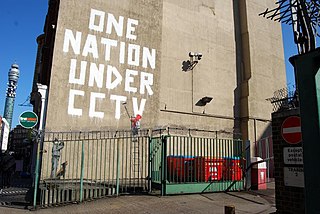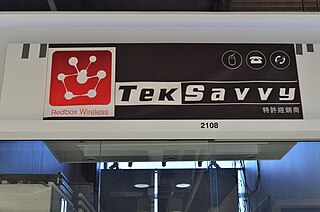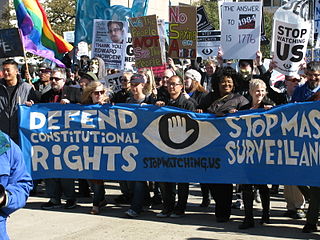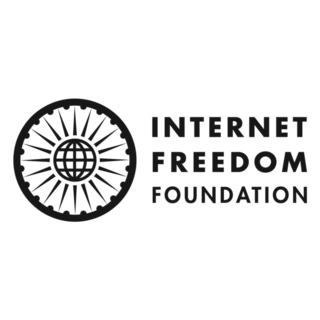Present-day telecommunications in Canada include telephone, radio, television, and internet usage. In the past, telecommunications included telegraphy available through Canadian Pacific and Canadian National.

Privacy is the ability of an individual or group to seclude themselves or information about themselves, and thereby express themselves selectively.
Computer and network surveillance is the monitoring of computer activity and data stored locally on a computer or data being transferred over computer networks such as the Internet. This monitoring is often carried out covertly and may be completed by governments, corporations, criminal organizations, or individuals. It may or may not be legal and may or may not require authorization from a court or other independent government agencies. Computer and network surveillance programs are widespread today and almost all Internet traffic can be monitored.
Center for Democracy & Technology (CDT) is a Washington, D.C.–based 501(c)(3) nonprofit organization that advocates for digital rights and freedom of expression. CDT seeks to promote legislation that enables individuals to use the internet for purposes of well-intent, while at the same time reducing its potential for harm. It advocates for transparency, accountability, and limiting the collection of personal information.

Privacy International (PI) is a UK-based registered charity that defends and promotes the right to privacy across the world. First formed in 1990, registered as a non-profit company in 2002 and as a charity in 2012, PI is based in London. Its current executive director, since 2012, is Dr Gus Hosein.

Michael Allen Geist is a Canadian academic, and the Canada Research Chair in Internet and E-Commerce Law at the University of Ottawa. He is the editor of four books on copyright law and privacy law, and he edits two newsletters on Canadian information technology and privacy law.

The Computers, Freedom and Privacy Conference is an annual academic conference held in the United States or Canada about the intersection of computer technology, freedom, and privacy issues. The conference was founded in 1991, and since at least 1999, it has been organized under the aegis of the Association for Computing Machinery. It was originally sponsored by CPSR.

European Digital Rights is an international advocacy group headquartered in Brussels, Belgium. EDRi is a network collective of non-profit organizations (NGO), experts, advocates and academics working to defend and advance digital rights across the continent. As of October 2022, EDRi is made of more than 40 NGOs, as well as experts, advocates and academics from all across Europe.

Canada ranks as 28th in the world for Internet usage with an estimated 35.34 million users or 93% of the population as of 2021. According to Harvard researchers, Canada has some of the lowest internet standards among OECD countries, as a result of high costs and slow internet speeds.
Net neutrality in Canada is a debated issue, but not to the degree of partisanship in other nations, such as the United States, in part because of its federal regulatory structure and pre-existing supportive laws that were enacted decades before the debate arose. In Canada, Internet service providers (ISPs) generally provide Internet service in a neutral manner. Some notable incidents otherwise have included Bell Canada's throttling of certain protocols and Telus's censorship of a specific website critical of the company.
Steve Anderson is a Vancouver-based Canadian open media advocate, writer, video producer, and social media consultant. He writes a monthly syndicated column called “Media Links”. Anderson was instrumental in starting a nationwide grassroots campaign to stop the Canadian Radio-television and Telecommunications Commission (CRTC) from allowing usage-based billing and ending flat-rate Internet access in Canada.

Charmaine Borg is a Canadian politician who served as the New Democratic Party (NDP) member of Parliament for the riding of Terrebonne—Blainville in Quebec from 2011 to 2015.
The Safe Streets and Communities Act is an act passed by the 41st Canadian Parliament 154–129 on March 12, 2012.

TekSavvy Solutions Inc. (TSI) is a Canadian residential, business, and wholesale telecommunications company based in Chatham, Ontario. In most of the country, it is a wholesale-network-access-based service provider and voice reseller, connecting its service to existing last mile networks from telecom carriers Bell Canada and Telus Communications, and cable carriers Rogers Communications, Cogeco Cable, Shaw and Vidéotron. However, in parts of rural southwestern Ontario, the service is provided over TekSavvy's own fixed wireless network. Recently they have also rolled out their own fibre optic network in parts of southwestern Ontario.

The Stop Online Piracy Act (SOPA) was a proposed United States congressional bill to expand the ability of U.S. law enforcement to combat online copyright infringement and online trafficking in counterfeit goods. Introduced on October 26, 2011, by Representative Lamar Smith (R-TX), provisions included the requesting of court orders to bar advertising networks and payment facilities from conducting business with infringing websites, and search engines from linking to the websites, and court orders requiring Internet service providers to block access to the websites. The proposed law would have expanded existing criminal laws to include unauthorized streaming of copyrighted content, imposing a maximum penalty of five years in prison.
The Protecting Children from Internet Predators Act was a proposed amendment to the Criminal Code introduced by the Conservative government of Stephen Harper on February 14, 2012, during the 41st Canadian Parliament.

The Cyber Intelligence Sharing and Protection Act was a proposed law in the United States which would allow for the sharing of Internet traffic information between the U.S. government and technology and manufacturing companies. The stated aim of the bill is to help the U.S. government investigate cyber threats and ensure the security of networks against cyberattacks.
Demand Progress is a US-based internet activist-related entity encompassing a 501(c)4 arm sponsored by the Sixteen Thirty Fund and a 501(c)(3) arm sponsored by the New Venture Fund. It specializes in online-intensive and other grassroots activism to support Internet freedom, civil liberties, transparency, and human rights, and in opposition to censorship and corporate control of government. The organization was founded through a petition in opposition to the Combating Online Infringement and Counterfeits Act, sparking the movement that eventually defeated COICA's successor bills, the Stop Online Piracy Act and the PROTECT IP Act, two highly controversial pieces of United States legislation.

Stop Watching Us was a protest effort against global surveillance that culminated in rallies on October 26, 2013.

Internet Freedom Foundation (IFF) is an Indian digital rights organisation that advances liberty, equality, fraternity and social justice in the digital age. IFF has three verticals of work that include strategic litigation, policy engagement and civic literacy.











